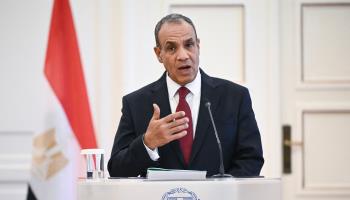Cairo is planning to ramp up diplomatic engagements, as other Middle Eastern countries edge it out of prominence
On August 12, Foreign Minister Badr Abdelatty spoke with his Iranian counterpart, Abbas Araghchi, suggesting a shift to increased engagement on Iran nuclear issues. Together with outreach to Turkey, this forms part of a wider policy of diversifying foreign ties, not least because of cooling US relations, and to bolster the country’s geopolitical standing in the face of rising competition for regional influence, including from the Gulf countries.
What’s next
Persistent economic troubles will constrain Egypt’s foreign policy reach, sustaining its reliance on Gulf aid and investments and forcing an inward focus. Egypt-Israel tensions over Gaza will simmer, bringing into sharp contradiction Cairo’s continued reliance on Israeli gas imports. Meanwhile, the complexity of the conflicts in Libya and Sudan, and Cairo’s backing for particular combatants, will limit the scope of Egyptian diplomacy.
Subsidiary Impacts
- Egypt’s diplomatic reach in regional countries such as Syria, Lebanon and Iraq will be limited.
- To sustain good ties with Cairo, Ankara will likely further constrain the activities of Muslim Brotherhood (MB) members on its soil.
- Any Saudi attempts to assert dominance over regional institutions such as the Arab League would temporarily strain Egypt-Saudi relations.
Analysis
Egypt is increasingly eclipsed by the Gulf states and Turkey, which are actively shaping the region’s dynamics (see MIDDLE EAST: The region will see a new power balance – July 17, 2025). For instance:
- Turkey played the role of kingmaker in Syria, helping allied rebels overthrow President Bashar al-Assad in December 2024 (see TURKEY: Ankara will look to shape post-Assad Syria – December 19, 2024).
- Turkey, Saudi Arabia and Qatar have since established close ties with Ahmed al-Sharaa, Syria’s new leader, providing Damascus with firm political backing and economic support.
- Qatar has additionally solidified its position as the region’s go-between, complementing its role in mediating the Gaza war with support for an Israel-Iran ceasefire in June (see OMAN/QATAR: Gulf mediation efforts will intensify – June 24, 2025).
- Saudi Arabia and the United Arab Emirates (UAE) are at the forefront of regional economic development, with major investment projects to diversify away from hydrocarbons.
Meanwhile, Egypt-Israel ties have grown more adversarial because of the latter’s conduct of the war in Gaza and blatant disregard for Egypt’s position (see EGYPT/ISRAEL: Rafah dialogue will be challenging – June 11, 2024 and see EGYPT: Israel relations face persistent pressures – March 28, 2025). Most critically, Cairo fears that Israel plans to transfer Palestinians out of Gaza and into Egypt permanently, which would have grave political, economic and security ramifications.
Despite this, Egypt’s energy imperatives leave it reliant on imports of Israeli gas. Earlier this month, Israeli firm NewMed Energy announced a “landmark deal” to export 130 billion cubic metres of gas to Egypt through 2040. Cairo justified the deal by portraying it as an extension of a 2019 agreement, predating the Gaza war (see EGYPT: Cairo will not heed backlash on Israeli gas – August 11, 2025).
Trouble with Trump
In a sign of shifting tides, Egypt was not included in President Donald Trump’s visit to the Middle East in May, which featured stops in Riyadh, Abu Dhabi and Doha. Washington appeared to be granting those capitals greater diplomatic heft — at Cairo’s expense.
Trump left Cairo out of his regional tour
In his first term in office, Trump’s relations with President Abdel-Fattah el-Sisi were exceptionally good. By contrast, policy differences have emerged early in Trump’s second term:
- Egypt rejected Trump’s calls for moving large numbers of Palestinians from Gaza into its territory. Rumours swirled at the time that Sisi indefinitely delayed a planned trip to Washington in response, although it was not clear that the visit had ever been confirmed (see EGYPT: Cairo struggles with Trump’s Gaza proposal – February 10, 2025).
- In a March leak of discussions on US strikes against Yemen’s Huthis, a US official allegedly said that Trump expects recompense from Egypt for helping to end disruptions to Red Sea shipping, while in April Trump demanded free transit for US commercial and military ships through the Suez Canal.
Despite these dynamics pushing Egypt to take stock of its ties with the United States, Cairo remains heavily dependent on sustained US military aid.
Gulf dependence
Egypt’s economy is now deeply reliant on international financial institutions and the Gulf states, which limits its scope to extend its influence abroad. Saudi and UAE support kept Egypt’s economy afloat in the aftermath of the 2011 Arab uprisings. Assistance, in various forms, was estimated at around USD100bn.
The UAE then provided even more financial support following Egypt’s economic crisis in 2022. Under the North African country’s largest-ever foreign direct investment (FDI) agreement, Abu Dhabi in 2024 extended USD35bn to develop a new city along the northern coast in Ras al-Hekma (see EGYPT: Balance of payments will get short-term relief – July 23, 2024).
Notably, unwavering Emirati support for Egypt comes despite policy differences in places such as Sudan, where the two sides back opposing sides in the country’s civil war. That suggests an understanding that Abu Dhabi and Cairo can retain close ties despite regional differences, aided by tight personal connections between Sisi and UAE President Mohammed bin Zayed Al Nahyan.
Saudi Arabia has held back on major new investments
Qatar is also reportedly finalising a deal with Egypt to invest USD3.5bn in a tourism project, while Egypt and Kuwait have discussed converting USD4bn in central bank deposits into investments.
However, Riyadh is now less forthcoming. It is focused on channelling resources towards its own economic plans, with less emphasis on foreign support.
Immediate neighbours
With Gaza mediation efforts at a relative standstill and limited outreach in the Middle East, Cairo appears more focused on North Africa, notably Sudan and Libya.
In Libya, Egypt was integral to the rise of eastern strongman Khalifa Haftar and his Libyan National Army (LNA) — it supported him directly and provided the launchpad for his military operations.
Yet Libya has settled into a frozen conflict characterised by a divided country with two rival governments. The outlook for a political resolution is dim, and Cairo’s diplomatic efforts are merely performative, aimed at signalling diplomatic weight but involving little meaningful action (see EGYPT: Haftar may yet skirt around Cairo’s interests – July 1, 2025).
Meanwhile, in Sudan, Egypt has backed the Sudanese Armed Forces (SAF) against the paramilitary Rapid Support Forces (RSF). Cairo has always been sceptical of militias and non-state actors, which is how its authorities perceive the RSF (see EGYPT: Sudan crisis will challenge national interests – May 5, 2023). However, the complexity of the conflict, the multiplicity of actors involved and Cairo’s alignments (including with the UAE, which backs the RSF) limit Egypt’s scope of action.
Elsewhere, Cairo has boosted security links with Somalia and is closely coordinating with Eritrea on developments in the Horn of Africa. It is motivated primarily by a desire to undercut Ethiopia, which it feels is threatening its water security through the Grand Ethiopian Renaissance Dam (GERD).
Cairo was unsuccessful in persuading the Ethiopian government to commit to a legally binding agreement on GERD. It now faces an effective fait accompli, with little leverage to alter circumstances (see EGYPT: Cairo seeks more links with the Horn of Africa – July 22, 2024).
Diversifying allies
Faced with these dynamics, Egypt is seeking ‘strategic balance’ by diversifying its foreign ties.
That includes continued detente with Iran, a country with which it has no formal diplomatic relations. Sisi met Iranian President Masoud Pezeshkian in December 2024 and Foreign Minister Abbas Araghchi in June. Egypt is primarily interested in leveraging Iranian influence with the Huthis in Yemen to end disruptions to global shipping via the Red Sea (see EGYPT/IRAN: Ties are heading for an upgrade – January 9, 2024).
Nonetheless, Egypt’s rapprochement with Iran is likely to proceed gradually. The security and military apparatus harbours lingering concerns over Iran’s regional role and its support for militant groups in Gaza, such as Palestinian Islamic Jihad.
Egypt-Turkey ties are also on a firmer footing. They had deteriorated significantly after 2011, as regional positions polarised over the Muslim Brotherhood (MB). At the time, Ankara and Doha supported the MB’s ambitions in Egypt, while Cairo pushed back with support from Riyadh and Abu Dhabi.
Ties hit an extreme low in 2013, when Ankara hosted MB leaders, meetings and anti-Sisi media platforms. However, as the MB’s regional momentum receded, Egypt-Turkey relations started improving in 2021, and ongoing outreach is likely.



